- 30 SportCat
- Sixty Solar Sail
- 40 PowerCat
- Sixty Solar Power
- Pricing & Options
- Financing & Trade-In
- Owners Support

Brokerage Events
Certified pre-owned yachts.

Certified Pre-Owned 2022 X5 Plus – LEVANTE – is now on sale!

Xquisite In-House Bahamas Boat Show on May 10-11, 2024

Certified Pre-Owned 2018 X5 “VANQUISH” is now on sale!

- Model: X5 Plus - LEVANTE
- Year Built: 2022
- Location: Alicante, Spain
- Price: $ 1,650,000

- Model: X5 - SHELL SHOCKED X
- Year Built: 2020
- Location: Freeport, Bahamas
- Price: $ 1,350,000

- Model: X5 - VANQUISH
- Year Built: 2018
- Price: $ 1,150,000

Designed for fast and fun sailing, island and beach hopping and occasional overnighting.
Xquisite 30 Sportcat
The Xquisite 30 Sportcat innovative and trailer transportable, designed to deliver the ultimate sailing experience. Easily handled by even non-seasoned sailors, and it can accommodate up to 8 persons onboard.
Very light weight construction, carbon beams, rotating carbon mast and high performance sails are part of the standard package and assures the sporty sailing experience.
The mini keels offer a convenient solution to navigate shallow waters while the optional dagger boards boost the performance even further.
The Xquisite 30 Sportcat: A Trailer-Transportable Catamaran for Ultimate Sailing Fun
30 Sportcat Gallery
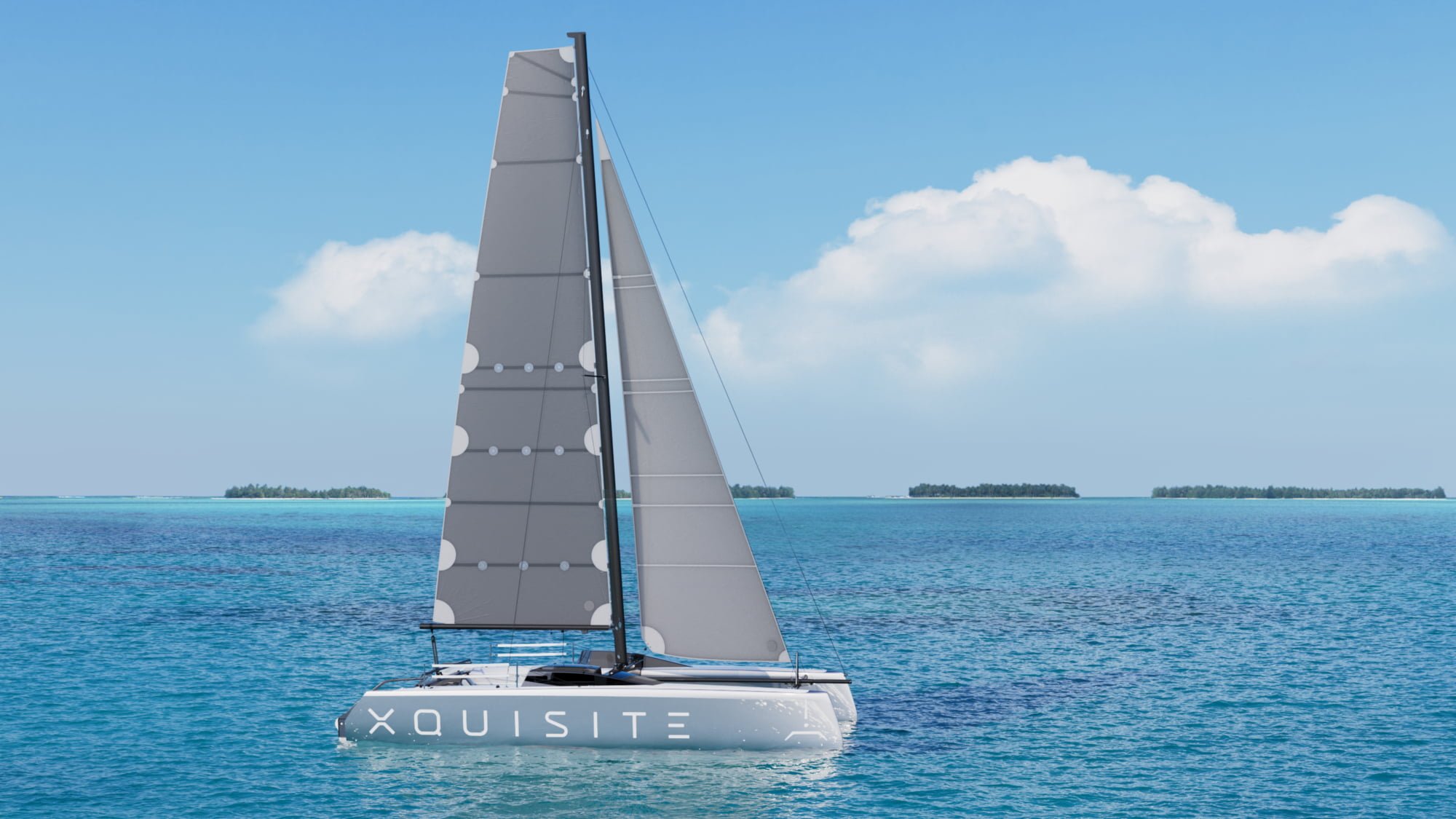
Xquisite 30 Sportcat Specifications & Extras
| Length overall | 9.25 m | 30.34’ |
| Length at waterline | 8.95 m | 29.36’ |
| Beam overall | 5.15 m | 16.89’ |
| Beam CL-CL | 4.1 m | 13.45’ |
| Light displacement | 850 kg | 1872 lbs |
| Draft (inc. outboard) | 0.872 m | 2.86’ |
| Draft Mini keel (daggerboards optional) | 0.75 m | 2.46’ |
| Full displacement | 1450 kg | 3196 lbs |
| Mast height | 13.20 m | 43.30’ |
| MS area | 29 m² | 312 sqft |
| Self-tacking jib area | 14 m² | 150 sqft |
| Gennaker area | 37 m² | 398 sqft |
| Outboard Engine (electric optional) | 10 HP | |
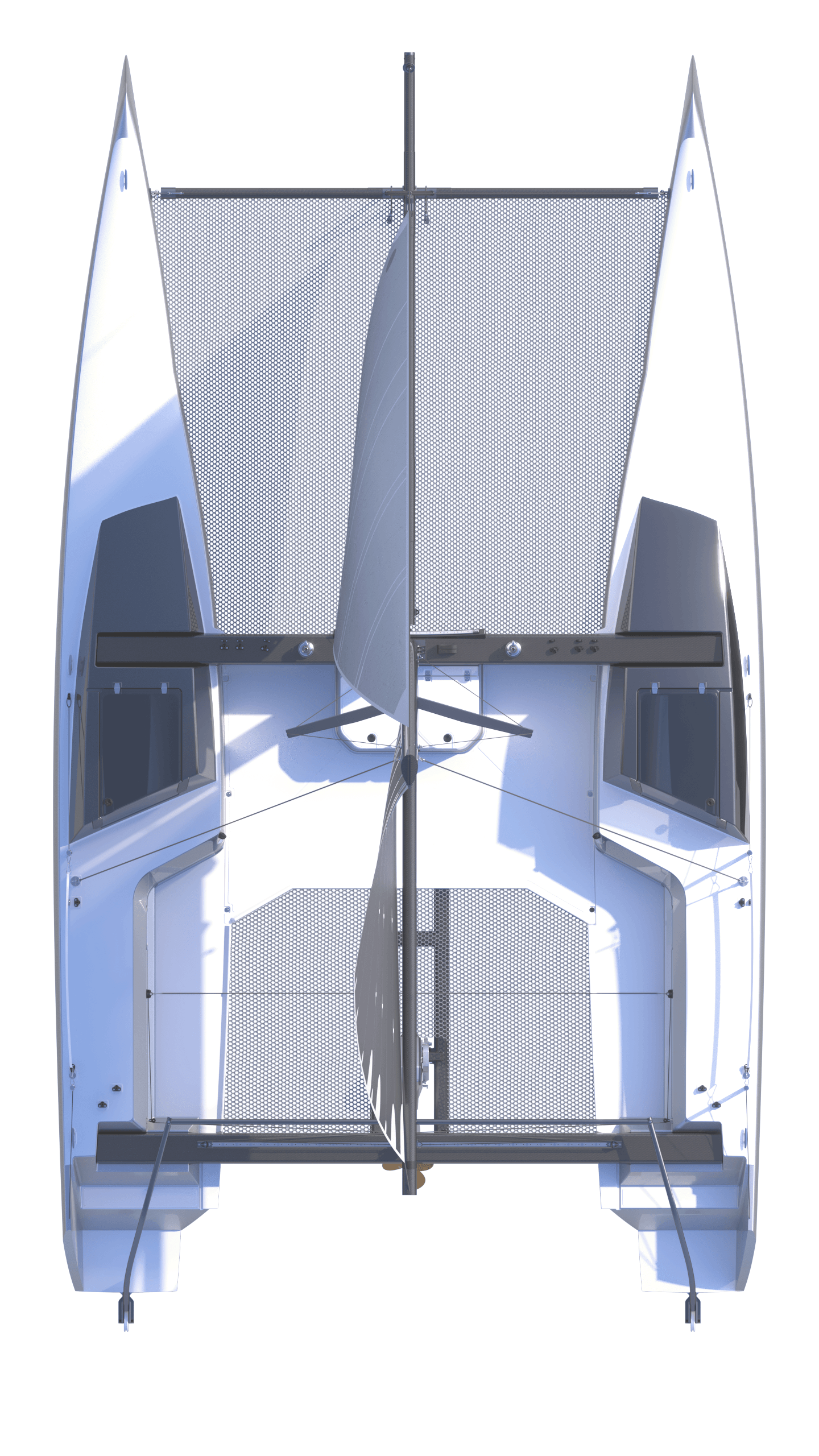
- E-Glass and Vinyl Ester Composite with Carbon Reinforcement Made by Infusion Method
- Flexiteek Sinthetic Decking
- Carbon Fibre Cross Beams
- Rotating Carbon Mast by Ag+
- Antifouling on Waterline Level on Hulls
- Carbon Bow Pipes
- Carbon Pipe Rudder Connectors and Fins
- Harken Sailing Hardware
- Carbon Stanchions
- Chemical Toilet
- Led Battery Light in Cabins
- 2x Mattresses in Cabins
- Black Mooring Cleats
- Large Trampolines
- Deck Windows 2x
- Outboard Engine Bracket
- Navigation Lights
- Square Top Mainsail 3Di ENDURANCE 760 14,700 Dp by NORTH SAILS
- Jib Medium 3Di ENDURANCE 760 14,700 Dpi by NORTH SAILS
- G Zero Gennaker NPL Code Xi Xi06 CDT by NORTH SAILS
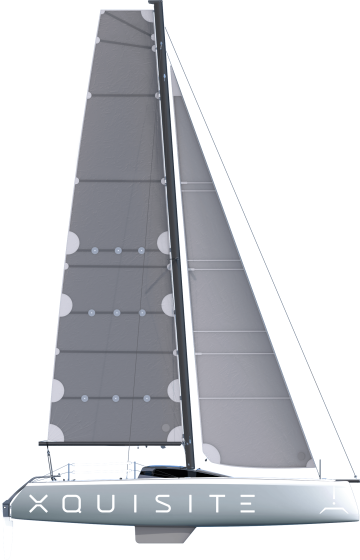
- Exterior Hull Paint
- Carbon Fibre Epoxy Dagger Boards
- Ipad With Waterproof Case and Navigation App
- Carbon Gangway
- Electric Outboard Motor
- Trailer for Easy Transportation
- Safety Pack With Pneumatic Vests, Falres, etc.
- Solar Panels and Battery Pack
- Parasailor Downwind Sail With Hardware
- Shipping and Commissioning
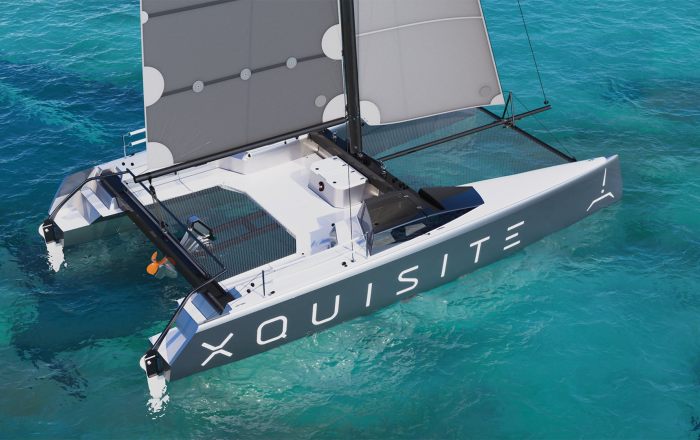
- 2024 BOAT BUYERS GUIDE
- SWS ADVENTURES
- Email Newsletters
- Fishing Boat Reviews
- Fly Fishing
- Marine Electronics
- Fishing Tackle
- Fishing Destinations
- The Bahamas Fishing Guide
- Boating Safety
- Ultimate Boating Giveaway

2023 Boat Buyers Guide: Catamarans
- By Karl Anderson
- December 27, 2022
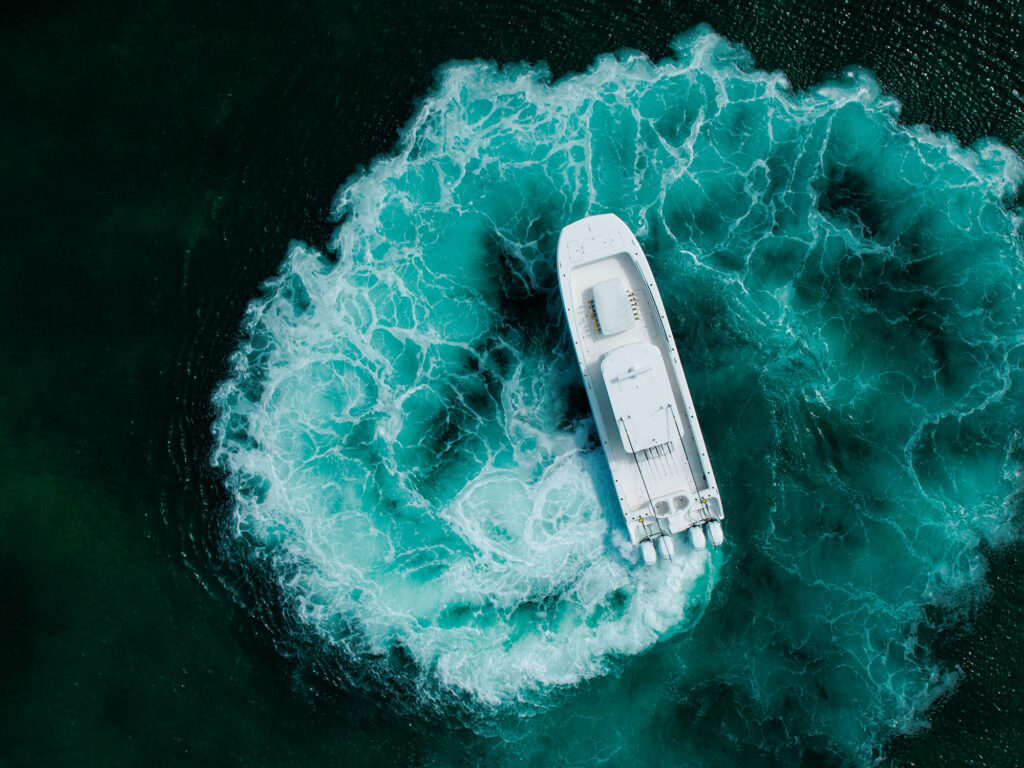
The popularity of the multihull (aka catamaran or cat) fishing boats has never been greater, as more and more boatbuilders enter this growing segment of the market. The inherent stability of the catamaran design rolls less with the seas, making fishing offshore less tiresome and more comfortable. Available from 20 to 48 feet, catamarans typically offer a large fishing platform with generous storage and fishing amenities. They are available in a wide variety of deck layouts, including center-consoles, dual-consoles, and even pilothouse and express variants.
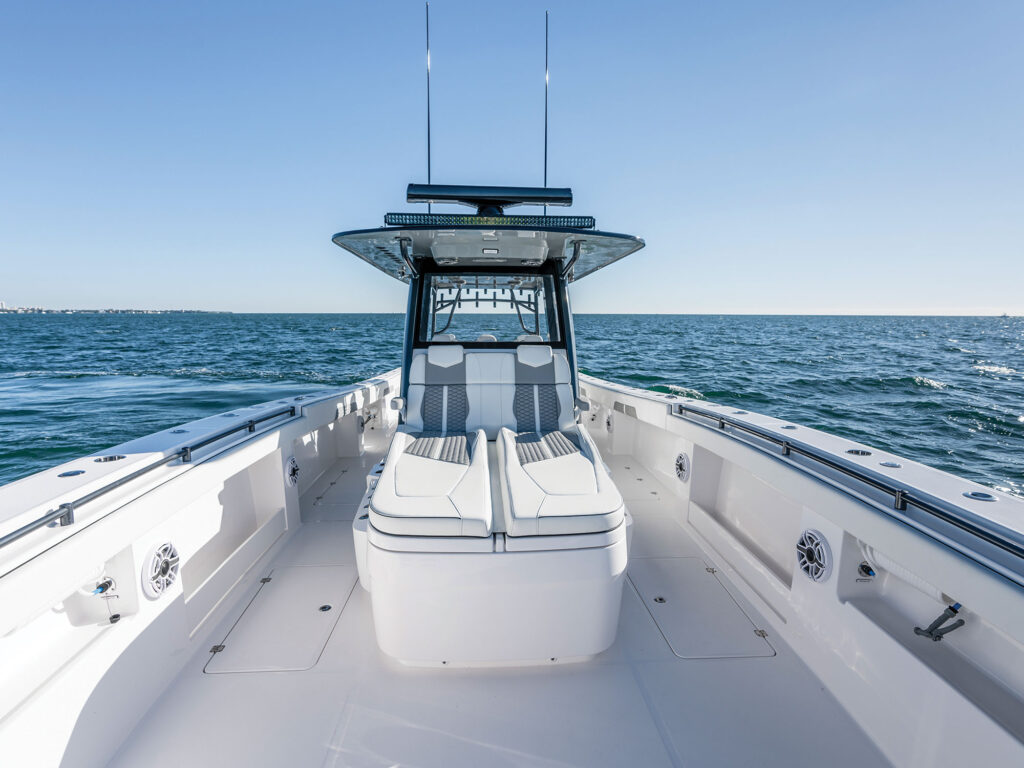
Big Picture
The large deck area of a catamaran enables many large underdeck storage lockers and insulated fish boxes in the sponsons. This gives anglers ample room for gear and the day’s catch. The catamaran’s stability, fishability, and smooth ride in rough seas make it attractive to anglers as well as day-cruisers. A center-console version adds 360 degrees of angler access to the rail. With the dual-console design, generous seating behind a beam-to-beam windshield makes for a great family fishing-friendly setup.
Live bait is one of the most popular types of fishing in virtually every coastal zone. To do it successfully requires optimal water capacity and proper flow. The minimum size of the outflow water plumbing should be twice the size of the inflow. The plumbing should have a drain at the bottom to shed scales at the end of the day, as well as a drain at the top of the well to adjust capacity and allow overflow. Above-deck transom-mounted wells should fully flood to the lids when running to keep baits from getting beat up.
Tip: A sump box with multiple pumps in case a pump fails is the best setup for first-rate livewells. Conveniently located inflow and outflow valves make it easy to optimize the flow without tiring your bait from swimming too much in the well.
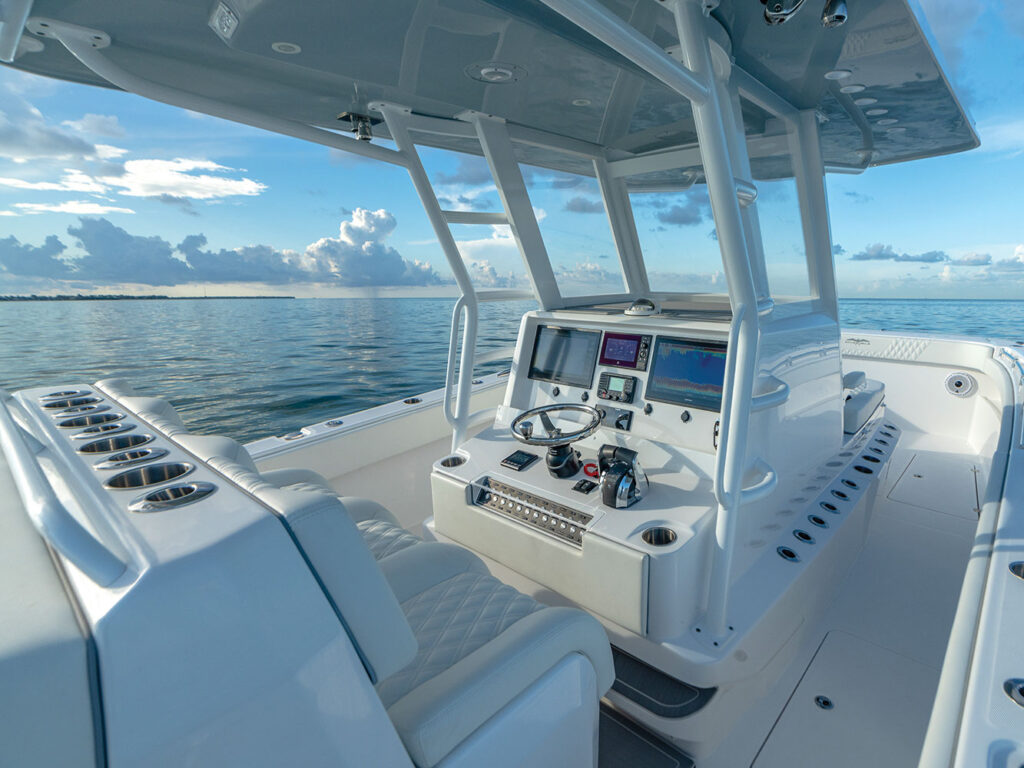
Rod Storage
Having enough rod holders is essential to be successful for opportunity fishing. Look for vertical rod storage along the console and across the back of the T-top. Many models also have rod holders along the outboard transom wall. Having plenty of gunwale rod holders for drift- and kite-fishing is helpful.
Tip: Placing adjustable swivel rod holders by Gemlux makes deep-dropping, lure-fishing and drifting even easier because they allow your rods to face the direction the baits are fishing, yet they can be swiveled back to keep rods from sticking out of the boat while running and docking.
Manufacturers often offer multiple choices for horsepower, but whatever the choice, the engines must come in pairs. For example, you might order twin outboards (one for each sponson) or four outboards (two for each sponson), but single- or triple-outboard configurations are not common on a cat. Optimal selection should be made based on user load, weight of the boat, ride comfort , performance desires, and best case for resale. It’s a rare day when you can run wide open, but having more horsepower gives better torque at slower speeds and thus better control. Running larger engines slower gives better fuel efficiency too.
Tip: When possible, choose the highest horsepower offered because it typically leads to a better resale value with a shorter sales cycle.
Power steering from engine manufacturer Optimus or SeaStar is essential with the higher horsepower required for larger boats, and it makes installing and operating the upper station in a tower far more practical and comfortable.
With the power demands of electronics, livewell pumps, stereo amps and more, it is wise to have at least two house batteries, and for larger boats, a third or fourth with a multibank charger for dockside. Each engine should have its own dedicated battery as well.

Electronics
Typically choosing the largest screen or multiple screens that will fit on the console is best-case scenario for ease of use, ergonomics, and visibility. VHF radios, stereo controller, and equipment switches for lighting, pumps, and accessories should all be integrated with greatest visibility and ease of operator reach.
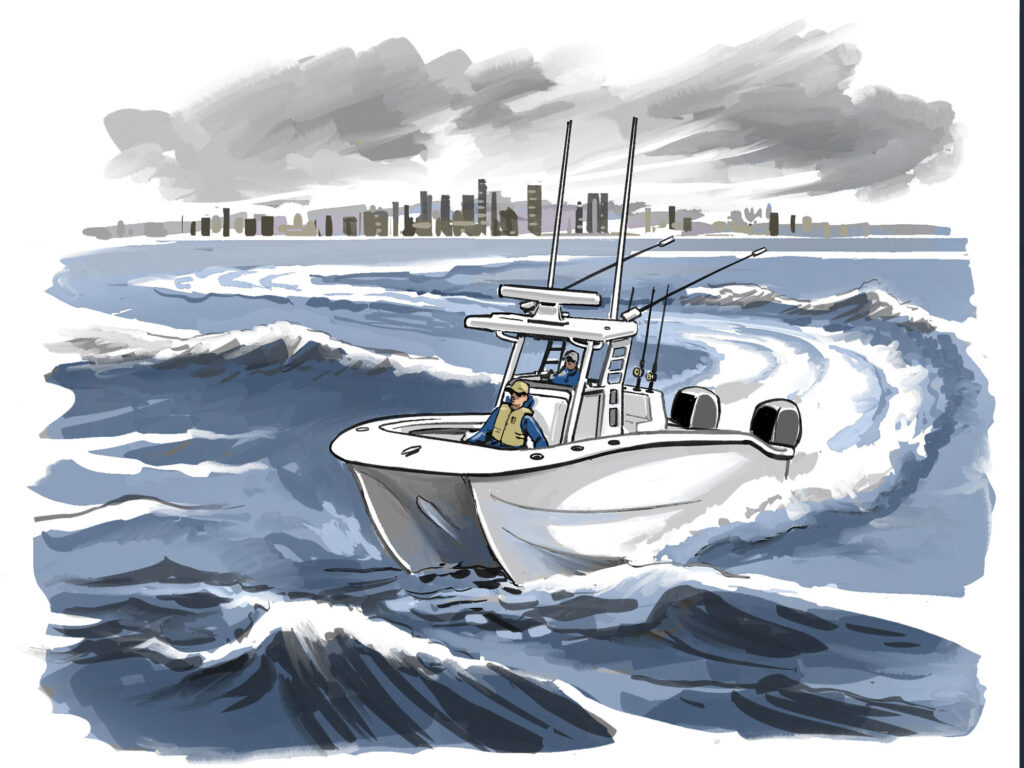
A Tale of Two Hulls
A catamaran rides on pair of hulls, or sponsons, each thinner and sharper than that of a similarly sized monohull boat. The narrow sponsons of the cat tend to slice easily through water to deliver a smooth ride, even in rough seas. At the same time, with the sponsons positioned out to the sides of the boat, cats tend to roll less, thus providing great stability to enhance crew comfort, security and safety. However, cats tend to corner more flatly than a monohull, and some hulls (but not all) tend to lean outward versus inward during a turn.
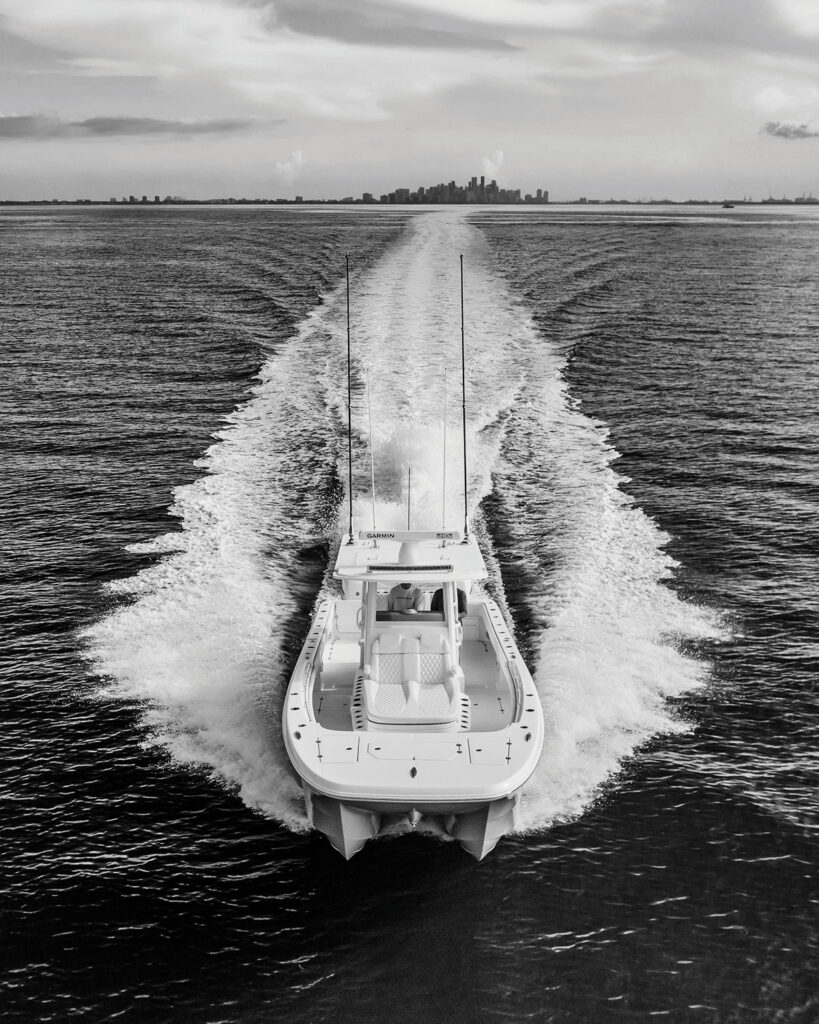
Experts Say
Newer designs such as Invincible’s Morelli and Melvin-designed semi-asymmetrical sponsons eliminate some of the negatives of the cat design, such as “sneezing,” where water sprays out the front of the boat when hitting a wave. They’ve also controlled the uncomfortable “outboard lean” sensation common in older designs when in a turn. Once transitioned to a catamaran, many become true believers and preach the benefits of the design.
Editor Says: Saltwater fishing cats not only offer superb stability and smooth ride, but some also display exceptional speed and range. I recall one trip out of Key West, Florida, aboard an Invincible 40 Cat with four 350 hp outboards to the Dry Tortugas. It was a 60-mile run, and we made it there in 70 minutes. We caught more fish than our arms could bear, and then dashed back to Key West, arriving in time for cocktail hour on the same day. -Jim Hendricks, Staff Editor, Boating and Fishing Group
- More: 2023 Boat Buyers Guide: More Resources , Boats

Bluewater 25T

How Much Live Bait Do You Really Need?

Delta Boatworks D245: 2024 Boat Buyers Guide

Albemarle 30 Express

Best Striper Topwater Lures of 2024
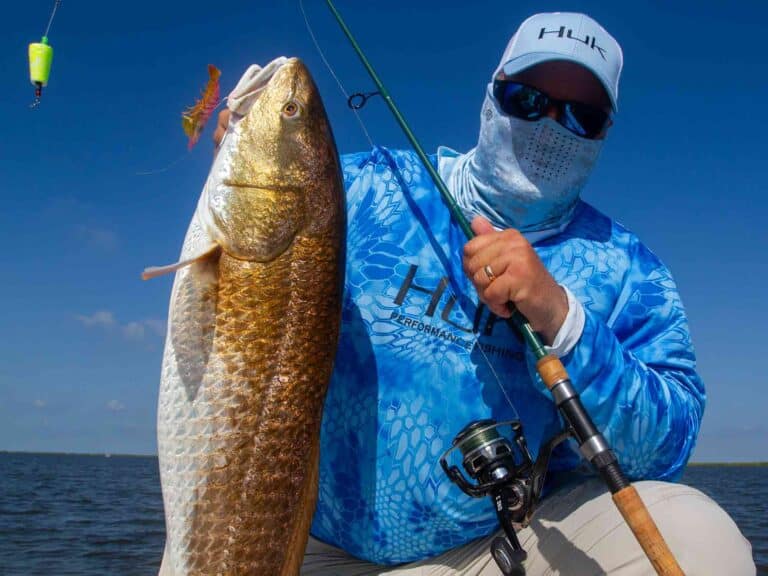
Catch More Fish With Popping Corks

Four Fisheries to Target Big Game This Winter

Using Electronics to Find Fish Around Structure

- Digital Edition
- Customer Service
- Privacy Policy
- Terms of Use
- Cruising World
- Sailing World
- Salt Water Sportsman
- Sport Fishing
- Wakeboarding

IMAGES
VIDEO